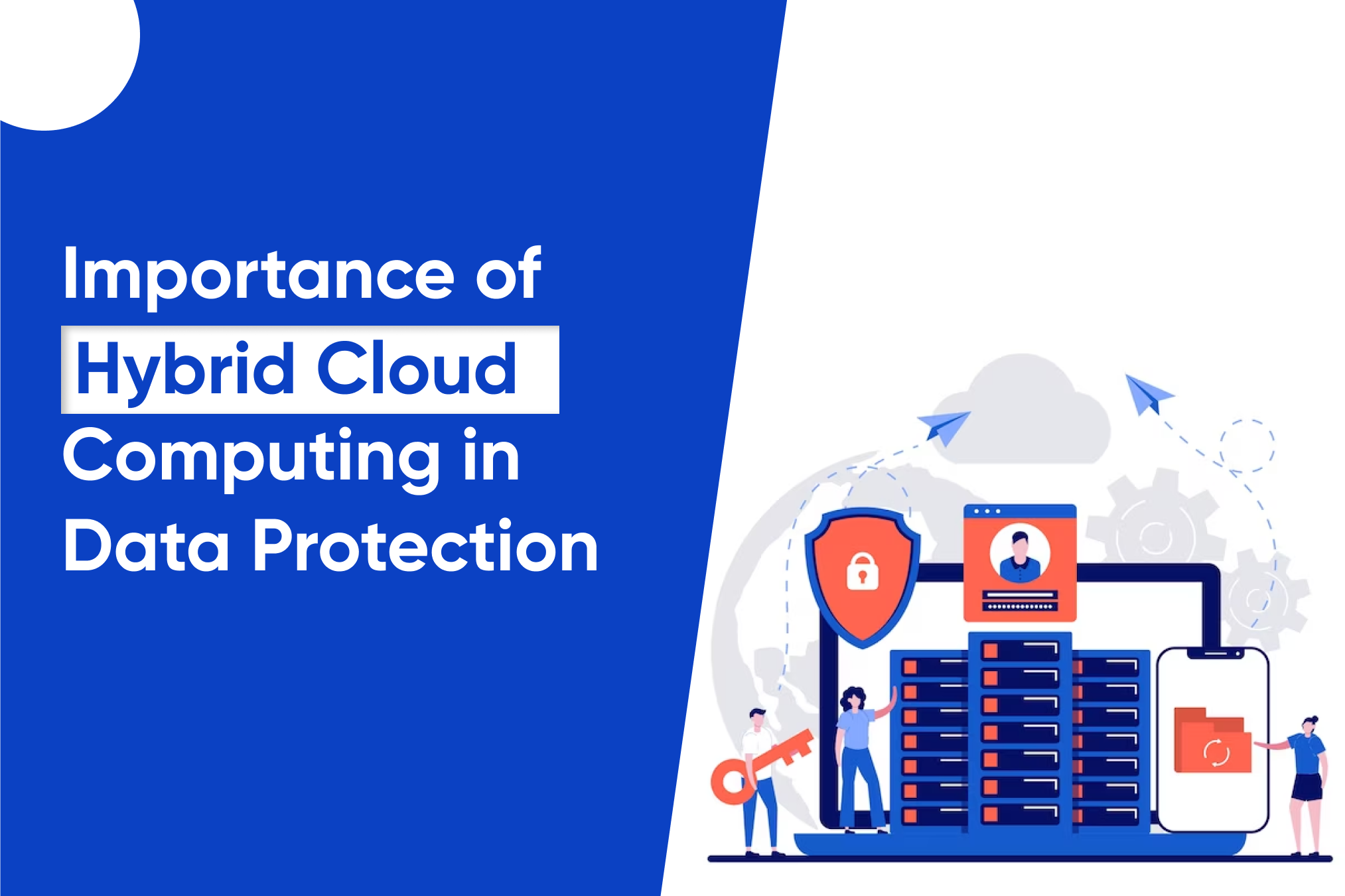

There's an uprising of digital transformations where data has become the lifeblood of organizations, assuring security and integrity as paramount options.
Our digital lives are made more comfortable and effective by the steady expansion of cloud computing, which has changed how we interact with digital technology. Files, images, and documents may be stored in the cloud and accessed from any device, anywhere, thanks to technology that makes data storage and access streamlined and dependable.
One can stop worrying about data loss when using cloud computing. Cloud computing has offered numerous benefits from unparalleled stability to data security concerns regarding data security and compliance have motivated businesses to adopt hybrid cloud computing services, to leverage the strengths of both public and private clouds enhancing data protection. In this blog, we will drive our reader's attention to the Importance of Hybrid cloud computing in data protection.
Hybrid cloud computing services are highly praised for combining the benefits of public and private clouds, serving organizations with credibility to store and process data seamlessly. With the advent of cloud computing services, businesses can easily rely on their data protection with the security of storing and processing important data. The burden of managing on-premises hardware and software can be easily tackled, with improved operational efficiency. Cloud service providers serve with robust security measures, including encryption, access controls, threat detection, and safeguarding data against unauthorized cyber attacks. More than this cloud computing services also enable backups, recovery of services, and ensuring data resilience in the face of unforeseen events.
Cloud computing services' scalability and flexibility enable enterprises to easily adjust to changing data protection regulations. Businesses may easily satisfy their specific objectives by using cloud resources, whether they are related to increasing security processes, expanding operations, or adopting compliance measures.
Cloud computing services serve as the foundation for comprehensive data protection strategies, allowing organizations to detect high risks, and assuring regulatory innovation strategies to safeguard highly valuable assets - Data. Exploring cloud computing services will not only enhance a smooth digital journey but also revolutionize seamless connectivity and reliable data protection.
One of the major reasons for opting hybrid cloud strategy and its ability to enhance data protection. With sensitive knowledge dispersed across multiple environments, organizations can execute powerful security measures tailored to their specific needs. Private cloud infrastructure ensures data remains within an organization's state without being passed on further to third parties. They uphold the ability to save data from unauthorized risks or access. Meanwhile, public cloud services offer advanced encryption and authentication mechanisms, bolstering overall security.
As we are aware, high authorities including educational organizations, healthcare, finance, and government compliance with strong data protection regulations is highly non-negotiable. Hybrid cloud computing helped organisations to take over data protection navigating complex regulatory landscapes effectively. By segregating data established on its sensitivity and regulatory requirements, businesses can ensure subordination while leveraging the scalability of public clouds for non-sensitive workloads.
Hybrid cloud computing is highly crucial in enabling organizations to implement robust data redundancy and disaster recovery solutions. Managing data across multiple cloud environments, including both public and private cloud organizations eradicates the risk of data sharing or loss out of the area. It also prevents data loss due to hardware failures, natural disasters, or cyber-attacks. In situations of disruptions, data can be conveniently restored from backup copies in unique locations.
The flexibility offered by hybrid cloud computing is highly appreciable especially when it empowers business strength to uphold pride in protecting data according to evolving business trends and technological advancements. With hybrid cloud architectures, businesses can conveniently optimize their resources up or down in response to fluctuating workloads, ensuring optimal performance and cost efficiency. Moreover, the flexibility of systemic workloads across multiple cloud environments enables organizations to influence the best-suited infrastructure for each application or service.
Cost efficiency is one of the important aspects for opting hybrid cloud computing in data protection. It is crucial, especially in matters of costs, to dynamically allocate resources across public and private clouds based on workload. Organizations can optimize infrastructure utilization and minimize operational expenses. Besides, according to pay as it goes, the pricing model increases allowing businesses to hold on to their resources to further avoid unnecessary expenses.
Effective management is imperative to ensure seamless work techniques related to data security. No doubt, hybrid cloud computing supports centralized planning for management streamlining resource provisioning, analyzing, and optimization across public and private clouds. This comprehensive, holistic approach towards management simplifies the path of IT operations, reducing complexity. This also supports agility and efforts supporting business requirements according to aspirations.
As per the above blog, the benefits of hybrid cloud computing can't be neglected, especially its pivotal role in enhancing data protection for modern organizations. By combining the strengths of public and private clouds, businesses can mitigate risks, ensure compliance, and maintain operational consistency in the world of evolving threats. As data continues to expand and is an important aspect of every business, adopting hybrid cloud computing is not only advantageous but crucial for staying ahead in today's digital landscape.
Prioritizing data protection through reliable hybrid cloud computing, a business can seamlessly elevate its digital landscape, empowering competitive growth in an increasingly volatile world.